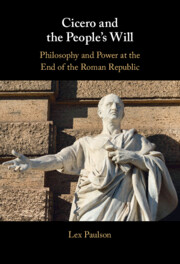
- Publisher:
- Cambridge University Press
- Online publication date:
- November 2022
- Print publication year:
- 2022
- Online ISBN:
- 9781009082587
- Subjects:
- Ancient History, Classical Studies, Ancient Philosophy
Our systems are now restored following recent technical disruption, and we’re working hard to catch up on publishing. We apologise for the inconvenience caused. Find out more: https://www.cambridge.org/universitypress/about-us/news-and-blogs/cambridge-university-press-publishing-update-following-technical-disruption

This book tells an overlooked story in the history of ideas, a drama of cut-throat politics and philosophy of mind. For it is Cicero, statesman and philosopher, who gives shape to the notion of will in Western thought, from criminal will to moral willpower and 'the will of the people'. In a single word – voluntas – he brings Roman law in contact with Greek ideas, chief among them Plato's claim that a rational elite must rule. When the republic falls to Caesarism, Cicero turns his political argument inward: Will is a force in the soul to win the virtue lost on the battlefield, the mark of inner freedom in an unfree age. Though this constitutional vision failed in his own time, Cicero's ideals of popular sovereignty and rational elitism have shaped and fractured the modern world – and Ciceronian creativity may yet save it.
‘Paulson’s book has laid the groundwork for a re-evaluation of the philosophical and political ideas that we have inherited from the Roman world.’
David Sedley - Laurence Professor of Ancient Philosophy, University of Cambridge
‘The story of Cicero has much to teach us about our own fragile republics – where their flaws began, and how we can still fix them.’
U.S. Congressman Jim Himes - Connecticut
‘If there is a single abstract noun that has done more to shape the modern world than any other, it may well be the Latin voluntas, which we ordinarily translate as ‘will’. In bold and commanding prose, Lex Paulson recounts this history for us, showing us the fascinating transformations of the concept of will in the work of Cicero. Paulson’s isolation of this key moment, and his expert account of its enduring relevance for our own polities, is nothing short of a revelation.’
Justin E. H. Smith - Professor of History and Philosophy of Science, University of Paris
‘Before reading Paulson's book, I knew Cicero as the Illinois burg with one of the world's first airfields, where Al Capone's gang ran rampant. As it turns out, the real Cicero was just as tough and every bit as ingenious.’
Sir Michael Lindsay-Hogg
'Paulson’s book provides an incredibly detailed look at Cicero’s use of the term voluntas and will be of particular relevance to those in the field of moral philosophy … Recommended.'
J. Boersma Source: Choice
‘Highly stimulating … an ambitious study that tackles an enormous body of evidence and offers an engaging and wide-ranging account.’
Bryn Mawr Source: Classical Review
‘… an ambitious study that tackles an enormous body of evidence and offers an engaging and wide-ranging account of the multiple dimensions of the Latin term voluntas in Cicero’s literary corpus. It will be of value to all those interested in the social, political, and intellectual history of the late Roman republic.’
Sean McConnell Source: Bryn Mawr Classical Review
 Loading metrics...
Loading metrics...
* Views captured on Cambridge Core between #date#. This data will be updated every 24 hours.
Usage data cannot currently be displayed.